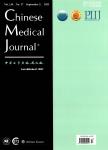Effects of prolactin on HLA-DR and CD40 expressions by human thyrocytes
催乳素对人甲状腺细胞表面HLA-DR和CD4 0表达的影响(英文)作者机构:中国医科大学第一临床学院内分泌科沈阳110001
出 版 物:《Chinese Medical Journal》 (中华医学杂志(英文版))
年 卷 期:2001年第114卷第11期
页 面:31-36,104页
核心收录:
学科分类:1002[医学-临床医学] 100201[医学-内科学(含:心血管病、血液病、呼吸系病、消化系病、内分泌与代谢病、肾病、风湿病、传染病)] 10[医学]
基 金:ThisworkwassupportedbytheNaturalScienceFoundationofLiaoningProvince (No 962 2 91)
主 题:prolactin ·Graves' disease · thyrocyte · HLA DR · CD40
摘 要:Objective To study the effects of prolactin(PRL) on HLA-DR and CD40 expressions by human thyrocytes,and to investigate the possible mechanisms for PRL to affect the development of Graves disease(GD).Methods Thyrocytes in secondary culture,which were from GD thyroid glands the tissues adjacent to the lwesions of multinodular goiter and andenoma(control group),were treated respectively with ovine PRL (oPRL),interferon-γ(IFN-γ),interlukin-4(IL-4)and oPRL plus IFN-γ(10U/ml)or IL-4(5ng/ml)for ***-DR and CD40 expressions on the thyrocytes were determined by immunofluorescent staining and flow cytometry. Results oPRL(12.5ng/ml-1000ng/ml)had no significant direct effect on HLA-DR or CD40 *** did not significantly affect the stimulation of HLA-DR expressions on the rwo groups of thyrocyte treated with IFN-γ or on GD thyrocytes treated with *** could antagonize the stimulation of CD40 expressions by IFN-γ and the inhibition by IL-4 on both groups of *** antagonizing effects were related to the concentration of ***-γ-stimulated percentages of CD40+ thyrocytes and delta mean fluorescence intensity(dMF)in both thyrocyte sources were significantly reduced in the presence of 200ng/ml oPRL(both GD and Control:P0.01and P0.05,respectively;Control:P0.05)and 1000ng/ml oPRL(GD:P0.01;Control:P0.05).oPRL caused significant increasing in IL-4-inhibited percentages of CD40+ cells from the two groups of thyrocytes at 12.5ng/ml and 1000ng/ml and dMF from GD thyrocytes at 1000ng/ml(P0.05).Conclusions PRL can exert indirect effects on CD40 expressions on thyrocytes by antagonizing the modulatory actions of IFN-γand IL-4 with dose-related *** may be one important mechanism for PRL to affect the development of GD.



